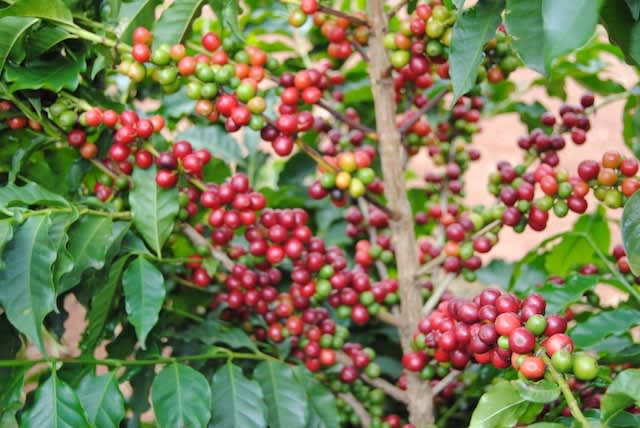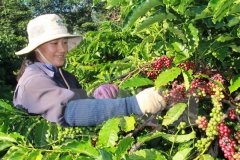Costa Rican Coffee Institute joins hands with Starbucks to explore new varieties of disease-resistant coffee

Professional coffee knowledge exchange more coffee bean information please follow the coffee workshop (Wechat official account cafe_style)
Article Source: food Information Center
At present, Instituto del Caf é de Costa Rica (Icaf é) is working with Starbucks (Starbucks), a well-known multinational coffee shop chain, to study the resistance of several coffee varieties to stem rust, anthracnose and "corns", in order to find varieties with strong disease resistance and climate adaptability, in order to improve the yield and competitiveness of Costa Rican coffee. Promote the sustainable development of coffee planting industry.
Icaf é and Starbucks signed an agreement to evaluate five coffee genotypes over the next four years to determine their yield, volume-to-weight conversion ratio and resistance to disease. Investigators will also assess the size, texture, smell, taste and flavor of these coffee varieties, as well as their adaptability to changes in climatic conditions.
Based on the same concern that existing coffee varieties are sensitive to disease and bad weather, which have a significant impact on Costa Rican coffee production, Icafe has been working with Starbucks for many years to develop new coffee varieties in Costa Rica coffee-growing areas that can adapt to different climates, soils and heights.
At present, the domestic coffee harvest in Costa Rica is 24 farnegs per hectare (that is, 24 piculs, 46 kilograms per kilogram), which is about 30 fenegs lower than a decade ago. Climate change and susceptibility to disease, and plant aging are the main reasons for the decline in Costa Rican coffee production per unit. Therefore, one of the important goals of the Costa Rican coffee industry at present is to identify new high-quality varieties that will help to improve productivity, thus raising the country's annual output from the current 2 million farneg to 3.2 million farneg about 10 years ago.
"now is the time to find new varieties with strong disease resistance and climate adaptability. Through this cooperation, the two sides will achieve a common goal: to seek better production conditions for the coffee industry. The two main coffee research centres in Costa Rica will be involved in this cooperation. " Head of Icafe, Shania? Chavez (Xinia Chaves) said.
Carlos Mario Rodriguez, an agronomist from Starbucks, said, "Starbucks believes in the power of teamwork, and we share a common goal with the representative of the Costa Rican coffee industry, Icaf é, to improve the socio-economic situation of Costa Rican coffee growers."
END
Important Notice :
前街咖啡 FrontStreet Coffee has moved to new addredd:
FrontStreet Coffee Address: 315,Donghua East Road,GuangZhou
Tel:020 38364473
- Prev

New research: caffeine helps improve memory! Do you always forget things? Have a cup of coffee!
Professional coffee knowledge exchange more information about coffee beans Please follow the Coffee Workshop (official Wechat account cafe_style) Research shows that caffeine helps to remember new information that has just been learned. The caffeine contained in a cappuccino (pictured) can help improve memory. Cathy Newman, National geographic 80% of Americans drink coffee in the morning
- Next

Arabica coffee can't adapt to climate change. Production is plummeting? Carbon dioxide may be the savior.
For more information on coffee beans, please follow the coffee workshop (Wechat official account cafe_style) at the end of last year, the United Nations Climate change Panel (IPCC) released a major research report on global warming of 1.5C, which solemnly warned that if countries do not reduce carbon dioxide emissions as soon as possible, global warming will exceed 1.5C between 2030 and 2053 [1]. However, President Sichuan of the United States
Related
- Can I make coffee a second time in an Italian hand-brewed mocha pot? Why can't coffee be brewed several times like tea leaves?
- Hand-brewed coffee flows with a knife and a tornado. How to brew it? What is the proportion of grinding water and water temperature divided into?
- What is the difference between Indonesian Sumatra Mantinin coffee and gold Mantinin? How to distinguish between real and fake golden Mantelin coffee?
- What does bypass mean in coffee? Why can hand-brewed coffee and water make it better?
- Unexpected! Ruixing Telunsu lattes use a smoothie machine to foam milk?!
- % Arabia's first store in Henan opens into the village?! Netizen: Thought it was P's
- Does an authentic standard mocha coffee recipe use chocolate sauce or powder? Mocha Latte/Dirty Coffee/Salty Mocha Coffee Recipe Share!
- What is the difference between Vietnam egg coffee and Norway egg coffee? Hand-brewed single product coffee filter paper filter cloth filter flat solution!
- What is the difference between sun-cured and honey-treated coffee? What are the differences in the flavor characteristics of sun-honey coffee?
- How to make Italian latte! How much milk does a standard latte use/what should the ratio of coffee to milk be?

